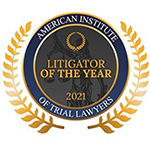Although the aftermath of a car crash can be both overwhelming and disorienting, it is important to act quickly to protect your well-being and your legal options. Time can feel like it is either slowing down or speeding up considerably after a wreck occurs. Take a few deep breaths to steady yourself and follow as many of the steps outlined below as are relevant to your situation. Acting quickly now can help to ensure that you remain as healthy, legally protected, and financially secure as you can possibly be in the wake of a crash.
Call for Emergency Medical Attention
If you (and/or anyone else involved in your crash) have been hurt or may be hurt in any significant way, don’t drive yourself to the hospital. Call an ambulance. Don’t worry about the potential expense right now. If you weren’t totally at-fault for the crash, you’ll likely be compensated for your medical expenses anyway. However, even if you’re concerned about paying for the ambulance ride, remember that safeguarding your health is the most important step you can take in the wake of a collision. If you require emergency medical attention, get the care you need. Everything else can wait.
If Possible, Move Your Vehicle to a Safer Spot
If your vehicle came to a halt in a traffic lane and it’s possible to move it safely to the side of the road, please do so. This effort will help to ensure that no one else hits your vehicle while you’re waiting for medical attention, the arrival of law enforcement, a tow truck, etc. Regardless of whether it’s possible to move your vehicle, make sure to engage your hazard lights to alert other motorists to the fact that your vehicle is stopped.
Call Law Enforcement to File a Report
If you did not need to call for an emergency response team to attend to your medical needs, it’s time to call 911, the highway patrol, or local law enforcement so that you can file an accident report. This is a necessary step regardless of whether you’ve been involved in a single-car accident, a multi-car accident, and/or any other parties involved have fled the scene. Filing an accident report now will help to ensure that your legal options are preserved and that filing an insurance report will be easier than it otherwise might be. If you don’t feel comfortable speaking with law enforcement without an attorney present (for any reason whatsoever), feel free to connect with an experienced personal injury attorney in the area before calling to file an accident report.
Preserve Evidence
The strength of any insurance claims and/or legal action you may file in the coming days and weeks will likely depend on the evidence you’re able to present on your own behalf. If you’re able to do so, take photographs of the scene from multiple angles. If you can, shoot a short video of the accident scene as well. If any witnesses saw your collision occur, note their names and contact information for future reference. If other motorists were involved in your accident, take down their names, contact information, and insurance information.
Contact an Experienced Personal Injury Attorney
If you haven’t already done so, connect with an experienced local lawyer who practices personal injury law. Even if you don’t plan on suing anyone else involved in your accident, you’ll want to schedule a free consultation to discuss your options in a confidential, risk-free setting. Oftentimes, accident victims fail to contact an attorney because they’re “only” filing insurance claims related to their accidents, not personal injury suits. Insurance companies are for-profit enterprises and will – whenever possible – act to protect their bottom line. Working with an experienced attorney will better ensure that you receive as much compensation as you’re entitled to and that your legal rights remain protected throughout the days, weeks, and months following your crash.
Record Your Memories of the Accident
Whenever you can, either at the hospital or once you’re at home, take some time to either write down your memories or record them via an audio or video file. Memories fade, change, and refocus over time. Writing down what you remember about the moments leading up to, during, and after your crash, before your memory adjusts is a valuable exercise. Not only can it help you refresh your memory whenever you want or need a refresher, but this exercise can also help your attorney as they work through your insurance claims and/or personal injury case. A little effort now can make a big difference down the road.
Make a Post-Accident Plan of Action
Once you’ve received medical care, filed a police report, preserved evidence, and scheduled a consultation with an attorney, it’s time to make a post-accident plan of action. You’ll ideally want to construct this plan in consultation with your lawyer. For example, you may need to connect with your insurance company. However, your attorney may advise you not to do so until they’ve had time to review your police report. Similarly, your attorney may advise you not to “green light” certain car repairs through your mechanic until your insurance company has been consulted. Ask your attorney what steps need to be taken both legally and financially in the wake of your accident. Ask if there are any special instructions you should follow when tackling these to-do items. That way, you’ll better ensure that your actions support your insurance and/or legal claims and don’t unintentionally compromise them in any way.
Legal Assistance Is Available
If you have been injured in a motor vehicle accident, please connect with an experienced personal injury attorney as soon as you possibly can to explore your legal options. For immediate assistance, you may either call 714-409-8991 or submit an online contact form through our firm’s website. Consultations are always free, confidential, and risk-free. We believe that all accident victims deserve access to the information they need to make knowledgeable choices about their options. Our team looks forward to assisting you with your legal needs at this time.










